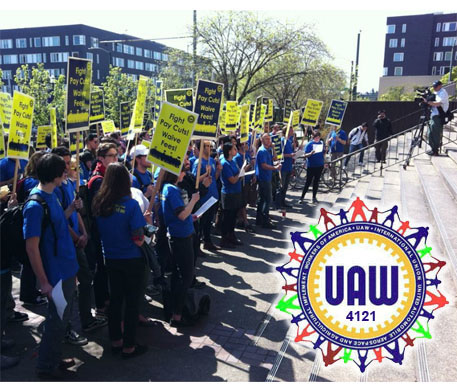LOCAL
May 15 strike called at UW; rally with student employees today
The following is from UAW 4121:
SEATTLE — On Thursday, May 10, academic student employees of UAW Local 4121 will announce that they will strike for a day on May 15 if UW administrators fail to offer a contract that meets their needs for fair pay and equitable treatment.
The strike will be the largest walkout in Washington state since the 2015 teacher strikes, and comes on the heels of major walkouts this spring of educators in West Virginia, Oklahoma, and Arizona protesting poverty pay and poor working conditions.
The UW graduate and undergraduate student employees will be joined by representatives from other on-campus unions, the King County labor community, and student groups to call on the University to settle a fair and equitable contract with UAW Local 4121 members and to bring attention to an impending strike.
TAKE A STAND — Join UW academic student employees and their supporters on Thursday from noon to 1:30 p.m. at the UW Seattle campus’s Suzzallo Library steps in Red Square. UAW Local 4121 members will speak about various bargaining points and how they affect them; local unions will give solidarity statements; and the group will march to watch ASEs confront the UW Board of Regents.
 Following the Red Square rally, union members will take their concerns directly to the public Board of Regents meeting where UAW Local 4121 members will share experiences about the rising cost of living in Seattle, the growing financial burden of
Following the Red Square rally, union members will take their concerns directly to the public Board of Regents meeting where UAW Local 4121 members will share experiences about the rising cost of living in Seattle, the growing financial burden of
paying student fees, healthcare challenges, and gender and racial equity.
“My colleagues and I will be striking on May 15 because we love the UW. In speaking out and taking strike action, we are also standing up for the value of higher education that is equitable and accessible to all,” said Meredith Durbin, a graduate student in the Department of Astronomy.
In refusing to recognize the needs of its academic student employees, the UW administration has brought a strike to their doorstep. On May 15, the 4,500 academic student employees who make up UAW Local 4121 will walk out, disrupting courses and research throughout the University of Washington’s Seattle, Bothell, and Tacoma campuses.
Academic student employees carry out essential work at UW. They conduct groundbreaking research and engage in high quality teaching, tutoring and grading. Despite the importance of their work to the University’s primary mission, “ the
preservation, advancement, and dissemination of knowledge ,” compensation is low. With the average academic student employee spending a staggering 44% of their income on rent and 82% being rent-burdened, many are left to make choices between housing, food, childcare, and other necessities in order to make ends meet.
“I work very hard to be financially responsible, but I live in UW housing, which is over 50% of my income. With $1,000 fees and no substantive wage increase, I’m unsure how to make more cuts to my budget,” says Emily Willard, a PhD candidate in the Jackson School of International Studies.
UW administrators have rejected union proposals to provide for the economic needs of teachers and researchers. Despite the cost of living in the Seattle area increasing by over 3% in the past year, administrators have offered only a 2% pay increase while refusing to waive student fees. In addition to demanding fair compensation, union members have called on the administration to provide fully trans-inclusive healthcare, full mental health coverage, and a modest increase to the childcare assistance fund for academic student employees. Each of these proposals has been rejected by the University’s bargaining team.
University administrators claim that UW is struggling from a lack of funds, with Provost Jerry Baldasty stating, “We don’t have a lot of money.” Yet this round of bargaining comes on the heels of a series of cases of financial mismanagement. The dean of the Dental School recently resigned over a $42 million budget deficit. The recent implementation of a new payroll system, Workday, ran $30 million over budget for a total of $90 million despite being plagued by issues resulting in thousands of employees experiencing late paychecks and problems with their health insurance enrollment.






